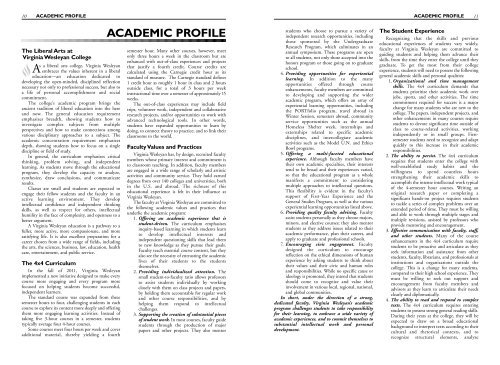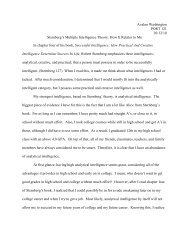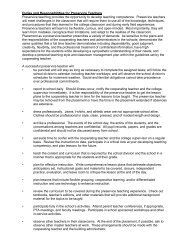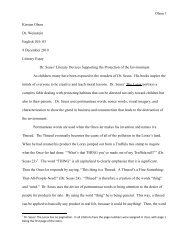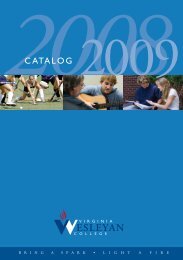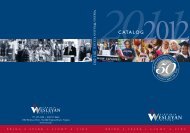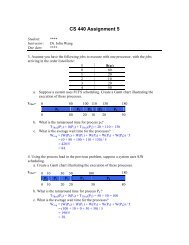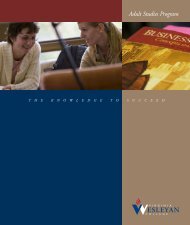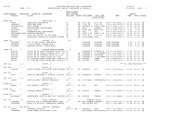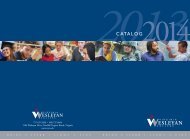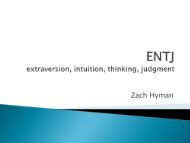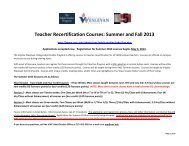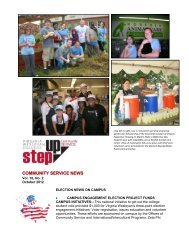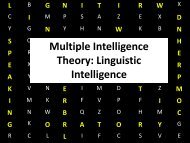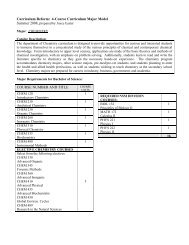Catalog - Virginia Wesleyan College
Catalog - Virginia Wesleyan College
Catalog - Virginia Wesleyan College
- No tags were found...
Create successful ePaper yourself
Turn your PDF publications into a flip-book with our unique Google optimized e-Paper software.
10 ACADEMIC PROFILEACADEMIC PROFILE11The Liberal Arts at<strong>Virginia</strong> <strong>Wesleyan</strong> <strong>College</strong>As a liberal arts college, <strong>Virginia</strong> <strong>Wesleyan</strong>embraces the values inherent in a liberaleducation—an education dedicated todeveloping the open-minded, disciplined reflectionnecessary not only to professional success, but also toa life of personal accomplishment and socialcommitment.The college’s academic program brings theancient tradition of liberal education into the hereand now. The general education requirementemphasizes breadth, showing students how toinvestigate complex subjects from multipleperspectives and how to make connections amongvarious disciplinary approaches to a subject. Theacademic concentration requirement emphasizesdepth, showing students how to focus on a singlediscipline or field of study.In general, the curriculum emphasizes criticalthinking, problem solving, and independentlearning. As students move through the educationalprogram, they develop the capacity to analyze,synthesize, draw conclusions, and communicateresults.Classes are small and students are expected toengage their fellow students and the faculty in anactive learning environment. They developintellectual confidence and independent thinkingskills, as well as respect for others, intellectualhumility in the face of complexity, and openness to abetter argument.A <strong>Virginia</strong> <strong>Wesleyan</strong> education is a pathway to afuller, more active, more compassionate, and moresatisfying life. It is also excellent preparation for acareer chosen from a wide range of fields, includingthe arts, the sciences, business, law, education, healthcare, entertainment, and public service.The 4x4 CurriculumIn the fall of 2011, <strong>Virginia</strong> <strong>Wesleyan</strong>implemented a new initiative designed to make everycourse more engaging and every program morefocused on helping students become successful,independent learners.The standard course was expanded from threesemester hours to four, challenging students in eachcourse to explore its content more deeply and offeringthem more engaging learning activities. Instead oftaking five 3-hour courses in a semester, studentstypically average four 4-hour courses.Some courses meet four hours per week and coveradditional material, thereby yielding a fourthACADEMIC PROFILEsemester hour. Many other courses, however, meetonly three hours a week in the classroom but areenhanced with out-of-class experiences and projectsthat justify a fourth credit. Course credits arecalculated using the Carnegie credit hour as itsstandard of measure. The Carnegie standard defines1 credit hour as roughly 1 hour in class and 2 hoursoutside class, for a total of 3 hours per weekinstructional time over a semester of approximately 15weeks.The out-of-class experiences may include fieldtrips, volunteer work, independent and collaborativeresearch projects, and/or opportunities to work withadvanced technological tools. In other words,students have expanded opportunities to learn bydoing, to connect theory to practice, and to link theirclassrooms to the world.Faculty Values and Practices<strong>Virginia</strong> <strong>Wesleyan</strong> has, by design, recruited facultymembers whose primary interest and commitment isto classroom teaching. In addition, faculty membersare engaged in a wide range of scholarly and artisticactivities and community service. They hold earneddegrees from over 140 colleges and universities, bothin the U.S. and abroad. The richness of thiseducational experience is felt in their influence at<strong>Virginia</strong> <strong>Wesleyan</strong>.The faculty at <strong>Virginia</strong> <strong>Wesleyan</strong> are committed tothe following academic values and practices thatunderlie the academic program:1. Offering an academic experience that isstudent-driven. The curriculum emphasizesinquiry-based learning in which students learnto develop intellectual interests andindependent questioning skills that lead themto new knowledge as they pursue their goals.Faculty teach essential course content, but theyalso see the necessity of entrusting the academiclives of their students to the studentsthemselves.2. Providing individualized attention. Thesmall student-to-faculty ratio allows professorsto assist students individually by workingclosely with them on class projects and papers,by holding them accountable for regular workand other course responsibilities, and byhelping them respond to intellectualchallenges.3. Supporting the creation of substantial piecesof student work. In most courses, faculty guidestudents through the production of majorpapers and other projects. They also mentorstudents who choose to pursue a variety ofindependent research opportunities, includingthose sponsored by the UndergraduateResearch Program, which culminates in anannual symposium. These programs are opento all students, not only those accepted into thehonors program or those going on to graduateschool.4. Providing opportunities for experientiallearning. In addition to the manyopportunities offered through courseenhancements, faculty members are committedto developing and supporting the wideracademic program, which offers an array ofexperiential learning opportunities, includingthe PORTfolio program, travel abroad inWinter Session, semesters abroad, communityservice opportunities such as the annualHomeless Shelter week, internships andexternships related to specific academicdisciplines, and intercollegiate academicactivities such as the Model U.N. and EthicsBowl programs.5. Offering a multi-faceted educationalexperience. Although faculty members havetheir own academic specialties, their intereststend to be broad and their experiences varied,so that the educational program as a wholemanifests a commitment to consideringmultiple approaches to intellectual questions.This flexibility is evident in the faculty’ssupport of First-Year Experience and theGeneral Studies Program, as well as the variousexperiential learning opportunities listed above.6. Providing quality faculty advising. Facultyassist students personally as they choose majors,minors, and elective courses; they also mentorstudents as they address issues related to theiracademic performance, plan their careers, andapply to graduate and professional schools.7. Encouraging civic engagement. Facultydesigned the curriculum to encouragereflection on the ethical dimensions of humanexperience by asking students to think abouttheir values and their civic and human rolesand responsibilities. While no specific cause orideology is promoted, they intend that studentsshould come to recognize and value theirinvolvement in various local, regional, national,and global communities.In short, under the direction of a strong,dedicated faculty, <strong>Virginia</strong> <strong>Wesleyan</strong>’s academicprogram challenges students to take responsibilityfor their learning, to embrace a wide variety ofacademic experiences, and to commit themselves tosubstantial intellectual work and personaldevelopment.The Student ExperienceRecognizing that the skills and previouseducational experiences of students vary widely,faculty at <strong>Virginia</strong> <strong>Wesleyan</strong> are committed toguiding students and helping them advance theirskills, from the time they enter the college until theygraduate. To get the most from their collegeexperience, students will need to possess the followinggeneral academic skills and personal qualities:1. Organizational and time managementskills. The 4x4 curriculum demands thatstudents prioritize their academic work overjobs, sports, and other activities. The timecommitment required for success is a majorchange for many students who are new to thecollege. The papers, independent projects, andother enhancements in many courses requirestudents to devote significant time outside ofclass to course-related activities, workingindependently or in small groups. Firstsemesterstudents need to recognize and adaptquickly to this increase in their academicresponsibilities.2. The ability to persist. The 4x4 curriculumrequires that students enter the college withwell-established study habits and thewillingness to spend countless hoursstrengthening their academic skills toaccomplish the intense intellectual work typicalof the 4-semester hour courses. Writing anoriginal research paper or completing asignificant hands-on project requires studentsto tackle a series of complex problems over anextended period of time. They must be willingand able to work through multiple stages andmultiple revisions, assisted by professors whoprovide mentoring and encouragement.3. Effective communication with faculty, staff,and other students. Many of the courseenhancements in the 4x4 curriculum requirestudents to be proactive and articulate as theyseek information and assistance from otherstudents, faculty, librarians, and professionals atinstitutions and organizations outside thecollege. This is a change for many students,compared to their high school experience. Theymust be willing to seek out support andencouragement from faculty members andadvisors as they learn to articulate their needsclearly and diplomatically.4. The ability to read and respond to complextexts. The 4x4 curriculum requires enteringstudents to possess strong general reading skills.During their years at the college, they will beexpected to draw on a broad educationalbackground to interpret texts according to theircultural and rhetorical contexts, and torecognize structural elements, analyze


